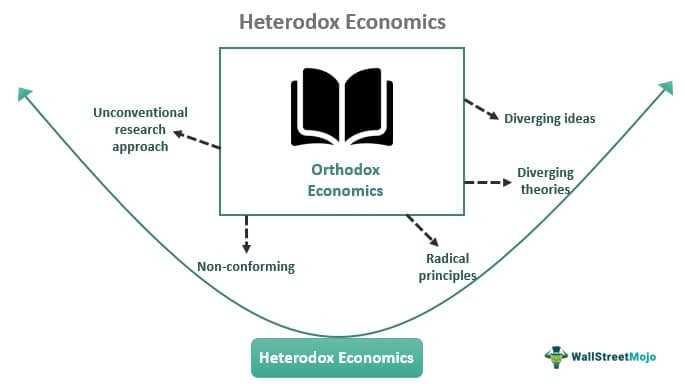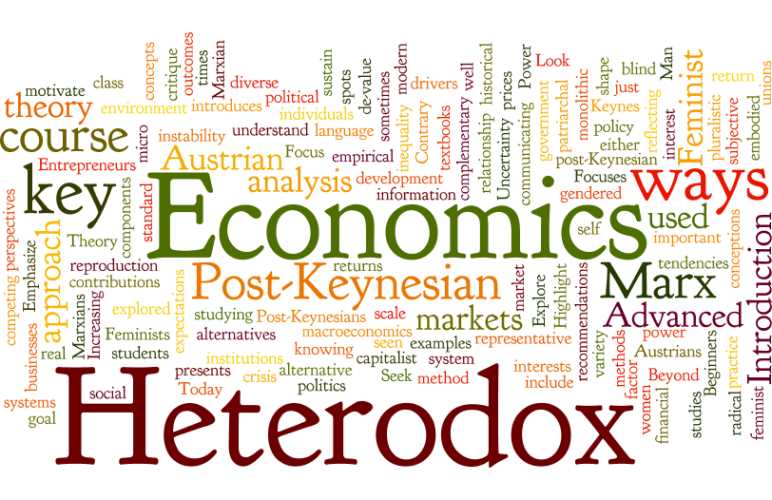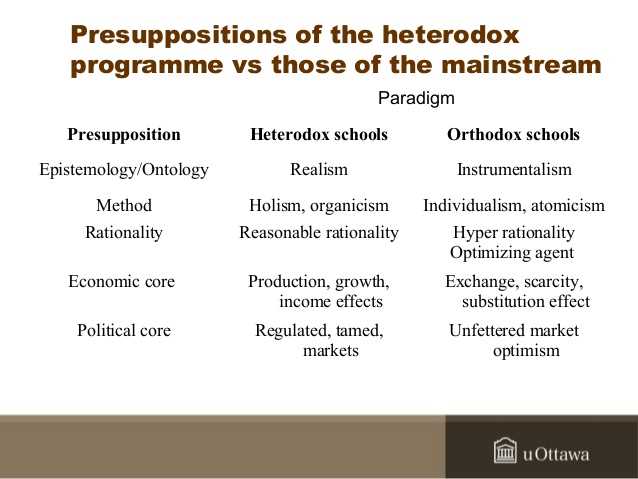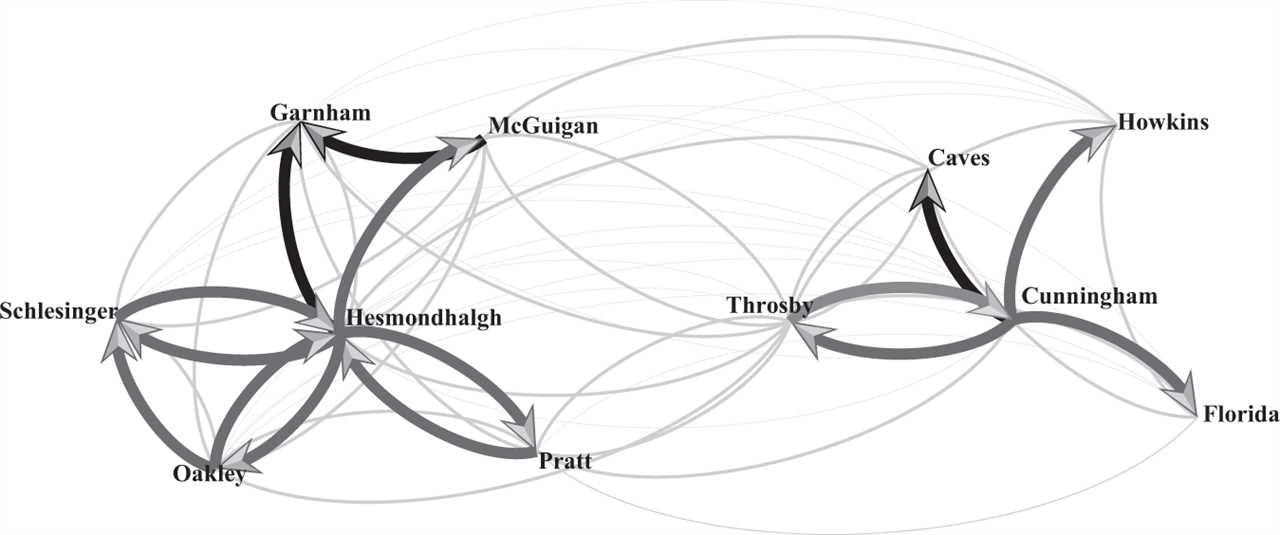Heterodox Economics: Definition, Examples, Vs Orthodox
Definition of Heterodox Economics
Heterodox economics encompasses a wide range of theories and schools of thought that deviate from the mainstream economic paradigm. It includes Marxist economics, institutional economics, feminist economics, post-Keynesian economics, ecological economics, and many others. These heterodox approaches often critique the assumptions, methods, and policy implications of orthodox economics.
Examples of Heterodox Economic Theories
There are numerous examples of heterodox economic theories that offer alternative explanations and solutions to economic issues. Some examples include:
- Marxist economics, which focuses on the role of class struggle and exploitation in capitalist societies.
- Institutional economics, which emphasizes the importance of institutions and social norms in shaping economic behavior.
- Feminist economics, which analyzes how gender inequalities affect economic outcomes and advocates for gender equality.
- Post-Keynesian economics, which challenges the neoclassical synthesis and emphasizes the role of aggregate demand and uncertainty in economic fluctuations.
- Ecological economics, which integrates ecological and economic systems to address sustainability and environmental issues.
Key Differences Between Heterodox and Orthodox Economics

There are several key differences between heterodox and orthodox economics:
- Heterodox economics is more pluralistic and open to different perspectives, while orthodox economics tends to be more focused on a single theoretical framework.
- Heterodox economics often incorporates interdisciplinary approaches, drawing insights from other social sciences, while orthodox economics is more self-contained.
- Heterodox economics challenges the assumptions and methods of orthodox economics, questioning the validity of rational behavior, market equilibrium, and efficiency as guiding principles.
- Heterodox economics tends to be more critical of the role of capitalism and advocates for alternative economic systems, while orthodox economics generally supports the free market and private property rights.
Benefits of Heterodox Economics
Heterodox economics offers several benefits:
- It provides alternative perspectives and critiques of mainstream economic theories, fostering intellectual diversity and innovation.
- It offers alternative policy prescriptions and solutions to economic issues, promoting social justice, sustainability, and human well-being.
- It encourages critical thinking and questioning of established economic dogmas, leading to a more robust and dynamic field of study.
What is Heterodox Economics?
Heterodox economics is a branch of economics that challenges the dominant orthodox theories and approaches in the field. It offers alternative perspectives and theories that question the assumptions and methodologies of mainstream economics. Heterodox economists believe that the orthodox approach is limited in its ability to explain and understand the complexities of the economy and society.
Heterodox economics encompasses a wide range of theories and approaches that differ from the mainstream neoclassical economics. Some of the key schools of thought within heterodox economics include Marxist economics, institutional economics, feminist economics, post-Keynesian economics, and ecological economics.
Key Features of Heterodox Economics
Heterodox economics is characterized by several key features:
- Interdisciplinarity: Heterodox economics draws on insights and methods from other social sciences, such as sociology, anthropology, and political science. It recognizes that economic phenomena are influenced by social, cultural, and political factors.
- Real-world focus: Heterodox economics places a strong emphasis on studying and analyzing real-world economic phenomena. It seeks to understand the complexities and nuances of the economy as it exists in the real world, rather than relying solely on abstract models and assumptions.
- Social justice orientation: Heterodox economics is often motivated by a concern for social justice and equity. It seeks to understand and address the structural inequalities and power imbalances that exist within the economy.
Critiques of Orthodox Economics

Heterodox economics challenges the assumptions and methodologies of orthodox economics for several reasons:
- Orthodox economics relies heavily on mathematical models and assumptions of rationality, which may not accurately reflect real-world economic behavior.
- Orthodox economics often overlooks the social and political dimensions of economic phenomena, focusing primarily on individual behavior and market forces.
- Orthodox economics tends to prioritize efficiency and economic growth over social and environmental concerns, neglecting the broader impacts of economic activities.
Conclusion

Examples of Heterodox Economic Theories
Heterodox economics encompasses a wide range of theories and approaches that challenge the mainstream neoclassical economic framework. Here are some examples of heterodox economic theories:
1. Marxist Economics: This theory, developed by Karl Marx, focuses on the relationship between labor, capital, and class struggle. It critiques capitalism and advocates for a socialist or communist economic system.
2. Feminist Economics: Feminist economists analyze how gender inequalities and discrimination impact economic outcomes. They highlight the unpaid labor of women and the undervaluation of traditionally female-dominated sectors.
3. Post-Keynesian Economics: Post-Keynesian economists build upon the work of John Maynard Keynes and emphasize the role of aggregate demand and the importance of government intervention in stabilizing the economy.
4. Institutional Economics: Institutional economists study how institutions, such as laws, regulations, and social norms, shape economic behavior and outcomes. They focus on the role of institutions in promoting or hindering economic development.
5. Ecological Economics: Ecological economists examine the relationship between the economy and the environment. They emphasize the finite nature of natural resources and advocate for sustainable economic practices.
6. Evolutionary Economics: Evolutionary economists study how economic systems evolve and change over time. They draw insights from biology and emphasize the role of innovation, competition, and adaptation in shaping economic outcomes.
7. Postcolonial Economics: Postcolonial economists analyze the economic legacies of colonialism and imperialism. They examine how power dynamics, exploitation, and unequal trade relationships continue to shape global economic structures.
8. Behavioral Economics: Behavioral economists study how psychological factors and cognitive biases influence economic decision-making. They challenge the assumption of rationality in neoclassical economics.
These are just a few examples of the diverse range of heterodox economic theories. Each theory offers unique insights and perspectives on how the economy functions and how it can be improved to better serve society.
Key Differences Between Heterodox and Orthodox Economics
Here are some key differences between heterodox and orthodox economics:
- Theoretical Framework: Heterodox economics challenges the mainstream neoclassical economic theory, which is the foundation of orthodox economics. Heterodox economists argue that the neoclassical theory oversimplifies economic behavior and fails to consider important factors such as power relations, social institutions, and historical context. Heterodox economics embraces a broader range of theories, including Marxist economics, feminist economics, and institutional economics.
- Methodology: Orthodox economics relies heavily on mathematical modeling and formal deductive reasoning. It emphasizes the use of mathematical equations and optimization techniques to analyze economic phenomena. Heterodox economics, on the other hand, adopts a more pluralistic and interdisciplinary approach. It incorporates qualitative methods, historical analysis, and case studies to understand economic behavior in a real-world context.
- Policy Implications: Orthodox economics tends to support free markets and limited government intervention in the economy. It advocates for policies such as deregulation, privatization, and fiscal austerity. Heterodox economics, on the other hand, recognizes the limitations of markets and emphasizes the role of government intervention in addressing market failures and promoting social welfare. Heterodox economists argue for policies such as income redistribution, public investment, and regulation of markets to achieve a more equitable and sustainable economy.
Benefits of Heterodox Economics

Heterodox economics offers several benefits that make it a valuable alternative to orthodox economics. These benefits include:
- Innovation and Creativity: Heterodox economics fosters innovation and creativity by challenging established theories and assumptions. It encourages economists to think outside the box and explore new ideas and approaches to economic analysis.
- Policy Relevance: Heterodox economics places a strong emphasis on the real-world application of economic theories. It seeks to develop policy recommendations that address social and environmental challenges, promoting a more equitable and sustainable economic system.
- Pluralism: Heterodox economics promotes pluralism by recognizing the coexistence of multiple economic theories and approaches. It encourages dialogue and debate among economists with different perspectives, fostering a more inclusive and open-minded academic environment.
- Addressing Power Relations: Heterodox economics recognizes the influence of power relations on economic outcomes. It seeks to analyze and challenge existing power structures, advocating for more democratic and participatory decision-making processes in economic policy.

Emily Bibb simplifies finance through bestselling books and articles, bridging complex concepts for everyday understanding. Engaging audiences via social media, she shares insights for financial success. Active in seminars and philanthropy, Bibb aims to create a more financially informed society, driven by her passion for empowering others.
